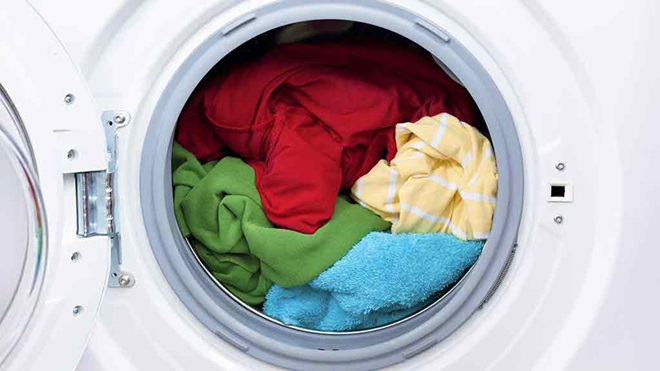Greywater is the waste water from showers, baths, spas, handbasins, laundry tubs, washing machines, dishwashers and kitchen sinks. It doesn't include water from toilets – that's called blackwater.
Using greywater on your garden can help save hundreds of litres of water a day, keeping your wallet happy and the planet happier still.
Washing machines account for almost a quarter of household wastewater – between 40 and 224 litres per wash (depending on your machine).
So if you have a particularly thirsty washing machine and wash six times a week, you could be sending up to 1350 litres of good clean drinking water down the drain every week (with an annual consumption of 70,180 litres!).
Add your dishwashing, shower and bath water and you're soon up to 4000L a week for the average family of four.
On this page:
How do you use greywater?
Greywater can be stored and used on the garden (or even in toilets or washing machines), or else it can be diverted to the garden with a plumbed-in diverter (basically a switch, so if it's raining it goes into the sewer instead).
Conditions may apply in the area where you live, so if you're considering using greywater, you should contact your local council for advice and to better understand the rules before you start.
DIY greywater options include attaching an extra-long flexible hose from the washing machine to the garden, or using a bucket.
Greywater safety tips
- Don't leave full buckets lying around if you have small children – they're a drowning hazard.
- Don't store untreated greywater for more than 24 hours; if you can't use it, don't keep it.
- If it's untreated, limit your use to water from the shower, bath and washing machine (preferably only the rinse water). Kitchen water contains fats and solids that might damage your soil and plants.
- If someone in your family is sick with gastro, flu or another contagious disease, stop using the greywater till they're better.
- Don't water herbs, vegetables, or pot plants without access to other kinds of moisture.
- Keep the greywater underground or under mulch – this helps prevent evaporation and keeps it away from kids and pets.
Find out more about how you can use greywater systems to save water.
Is washing machine greywater safe?
In our laundry detergent reviews, we tested the washing water for chemicals that could harm your garden. We found the components most likely to cause problems are phosphorus, salinity, sodium and pH to varying degrees.
Phosphorus
Small amounts of phosphorus can be useful for plants, and it's a major component of fertiliser.
But when it gets into our waterways, it can cause excessive algae growth, leading to toxic algal blooms. The effect on your soil is varied depending on your soil type.
- Clay soils can deal with more phosphorus because the phosphorus binds to clay minerals and doesn't leach away.
- On sandy soils, excess phosphorus can leach into groundwater.
- Australian soils are typically low in phosphorus, and some native species can't tolerate high levels.
Luckily, or one might say sensibly, modern laundry detergents no longer contain phosphates, so this issue is largely a thing of the past.
Salts
All laundry detergents contain salts, typically sodium salts such as sodium nitrate, sodium sulphate, sodium phosphate and sodium silicate, making them highly saline. Check out our laundry detergent buying guide to learn more.
Sodium is particularly detrimental not only to plants, but soils. It affects the soil's permeability and causes a loss of structural stability, so frequent long-term use is likely to harm your garden, unless you take care to spread your laundry greywater over a large area.
Alkalinity
Laundry detergents are also highly alkaline, that is, detergents that have a high pH. A pH that's higher than 10 helps dissolve organic dirt, such as grease, oils and food scraps. For reference, a pH of 7 is considered neutral, but your highly caustic oven cleaner has a pH closer to 12.5.
Most biological systems prefer a pH between 6 and 9, and greywater with a high pH is likely to harm many plants and soil organisms.
We consider the total load of problem chemicals that will accumulate in your garden over time, not just their concentration when you first put them on. The larger the irrigation area (minimum recommended area is 150–200m2), the more you'll spread the chemical load.
Potential impacts are very much dose-dependent. Try reducing the amount of detergent you use, assuming that the reduced amount will still get your clothes clean enough.
If you want to install a greywater pre-treatment system, do all of the above, plus:
- consult your sewage removal authority if you intend to redirect all or a major part of your used water
- consult a licensed plumber for advice on the best system for your needs
- inform your water supply authority of any changes to your plumbing.
We're on your side
For more than 60 years, we've been making a difference for Australian consumers. In that time, we've never taken ads or sponsorship.
Instead we're funded by members who value expert reviews and independent product testing.
With no self-interest behind our advice, you don't just buy smarter, you get the answers that you need.
You know without hesitation what's safe for you and your family. And our recent sunscreens test showed just how important it is to keep business claims in check.
So you'll never be alone when something goes wrong or a business treats you unfairly.
Learn more about CHOICE membership today
Stock images: Getty, unless otherwise stated.



